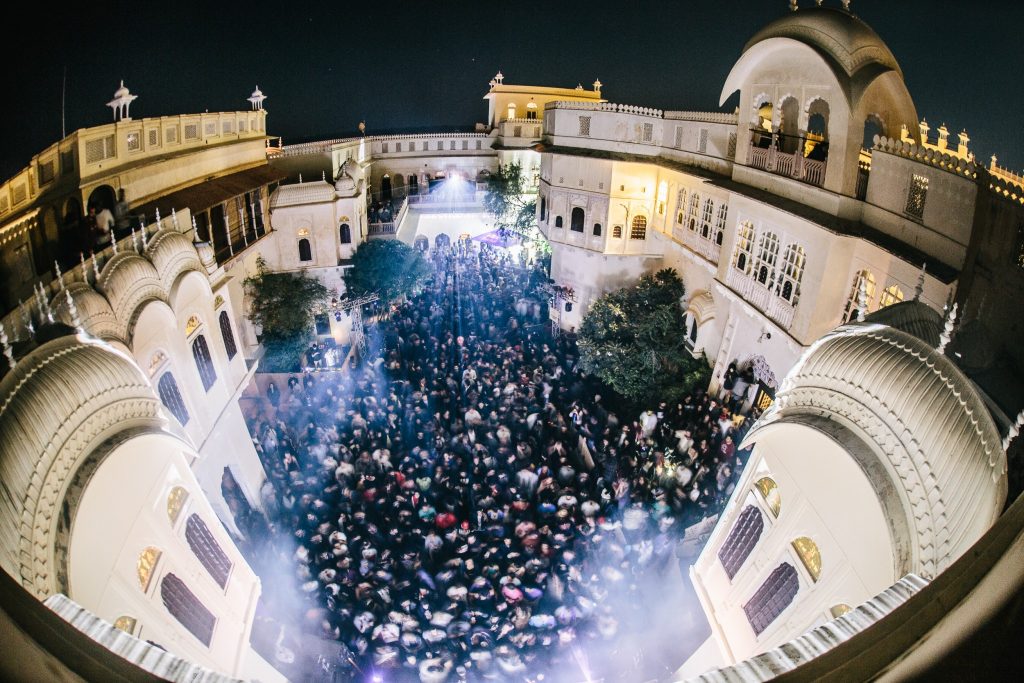We are delighted to launch our new spotlight series in India with a collaboration with SUBMERGE (India’s leading dance music collective founded by Nikhil Chinappa).
During our conversation with Nikhil and Manny (collective member), we had the opportunity to look at the health of the Indian music scene and gain an insight in to topics such as gender & cultural appropriation. Furthermore, we hear about the various challenges the industry is facing and India’s ability to adapt and evolve.
To support the feature, they also curated 3 artists to showcase a distinctly Indian underground sound. We will release one mix per week on Thursdays during November. First up is 8 Bit Culprit, followed by Totoroto and Manny himself.
——————-
Hey Manny and Nikhil, First off how’s life for you both right now, and where are you spending your days/time? And how are you guys keeping yourself busy with music?
Nikhil: It is very much a wait and see the situation for us in the entertainment industry, and I think that’s the situation across the world as well. Entertainment, live events, and clubs tend to be the first one out & last one back in. With respect to the electronic music scene, India has been particularly hard hit. Personally, I think the entire industry is on pause even though our very survival is at stake and we all wish there could be more support from the government for the arts/music/culture scene. Gigs have gone from being fully functional in February to ground zero in March. So it’s not a pretty scene and I think everybody’s just hunkering down and hoping for things to get better soon.

(Nikhil Chinappa, Source: Submerge – India)
Manny: I’ve been alright. Been in Chennai since the pandemic hit. Naturally, it took me some time to re-calibrate in the beginning, but I have been making most of the downtime since to work on several new music projects. With the help of Nikhil, I started a weekly stream with Submerge called the“044 Collective” which features Indian and international talent and is one of the longest-running streams here since the lockdown. Besides that, I did a few streams with Submerge, one of which successfully helped raise funds for communities impacted by Covid-19 in India. I’ve also been working with some amazing independent musicians for a new music community platform called “Circle of Love” and have been spending a fair amount of studio time experimenting with new music that I’m really enjoying at the moment which is not necessarily danced floor focused.

(Manny, Source: Submerge – India)
It’s of course been a tumultuous year across the globe but how’s it been in India so far? We imagine this has put a heavy burden on the venues, promoters, and artists. How is the electronic music community reacting and surviving? Here in Amsterdam, we’re seeing some of our biggest clubs shut their doors for good, are there going to casualties in India?
Nikhil: With respect to clubs, I was just talking to a friend of mine who told me that a lot of venues have actually let go of their resident DJ’s because obviously there’s no business for seven months. But some venues continue to keep the DJs on the payroll at a lower fee to keep them employed. But I am sure, that sooner or later, these venues will rehire the people who made that music possible but I will not rule out the fact that there Is going to be a renewed conversation between artists and venues. I see this happening mainly on the subject of Dj fees which will be reduced to a lower level as venues can’t afford the price tag anymore and since everyone knows that they are in this together, there will be negotiation and possibly a new operating model that will help people to make things work for each other and help each other in the process. I am putting forth a largely positive outlook out of the current situation as I am aware that times are going to be tough on us and my 20+ years’ experience of being part of a progressive and forward-thinking community tells me that we will find solutions and find a way to get thru this together. I believe that Indians tend to be creative and innovative at stressful times. I believe most will find a way of either cutting down on the staff or asking staff to reduce salaries. This is not an ideal situation But I’m pretty certain that we are a community that has gone through problems like this before and we’ll find solutions since we all are aware that there is no other option.
On this note, venues have slowly started to open, functioning at 50 % capacity and I recently spoke to a music-related association in Bombay and they suggested that they are hoping to get things started sometime now but with a lot of restrictions and limited capacity, which I think makes sense because Covid – 19, hasn’t gone away in India. India’s caseload is the highest in the world right now. We’re taking more cases per day than any country, any region at any point in time during the pandemic. So this has definitely caused us to continue being concerned and wary. So we’ll be looking to the authorities, the doctors, and scientists for their advice on how to move in these uncertain times responsibly.
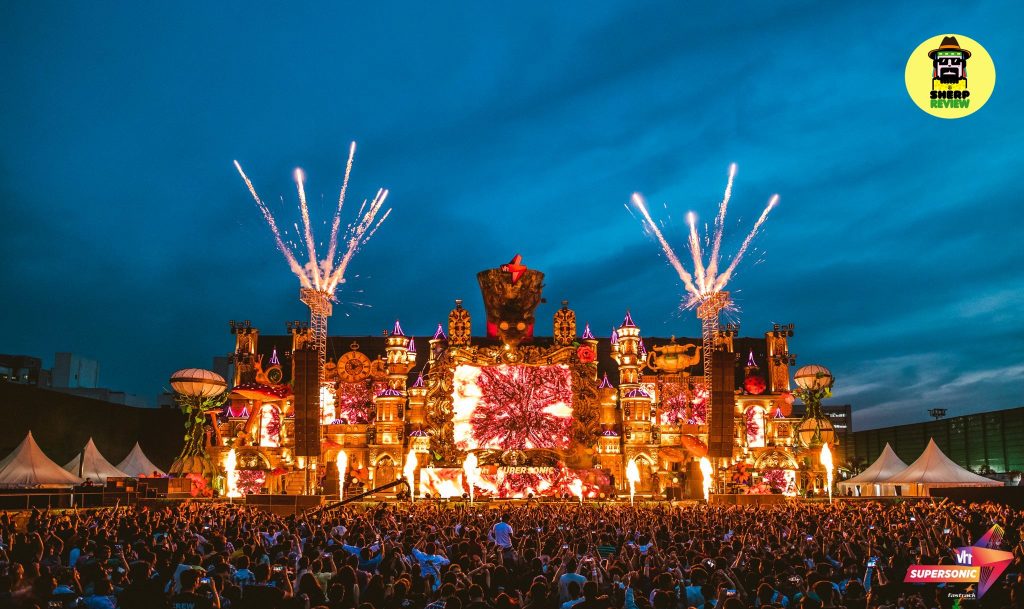
Large-scale electronic festivals and events, finances in India are closely guarded secret in terms of the books so we don’t really know what’s happening with them or how their future will look like. I don’t see festivals going ahead anytime soon but I do see possibilities of venues innovating and adapting to the circumstances such as reducing capacities, maybe changing their format to a certain extent. Hypothetically speaking, a festival could go from being a multi-genre festival with several stages to (theoretically speaking) table festivals where you have just one stage and your favourite bands and DJ’s performing on stage while people enjoy the music and drink beer. I’ve seen that happen in Scandinavia quite a lot, especially during the summer months, because the weather’s been good where people have been doing events outdoors with seated arrangements. So there is going to be a certain element of social distancing. You place a protocol both for the festival crew, for staff, and for guests, and in this manner, I think you can still find innovative ways of working through things. But first and foremost, we are still awaiting scientists and the doctors to give us the green light and what protocol we should stick to successfully carry out events. It’s really a wait and sees the situation in all aspects.
Manny, Further to this, what is the status of the scene now, and what trends do you see coming through?
Manny: The Indian underground has been a hive of activity. There is a vibrant indie live scene with some world-class singer/songwriters, a flourishing regional hip-hop movement, and the electronic music scene has been exporting some tremendous talent over the last few years. Acts are getting more experimental and pushing new sounds, Indian labels are getting global recognition, music festivals and venues are programming different styles of music catering to the increasing fan base for alternative and underground styles. This whole lockdown situation has in a way helped many artists reinvent themselves and people have been discovering some great new music. I don’t think there has ever been a better time for the local talent to rise across the country and I’m sure we will be hearing about a lot more new artists who are pushing the envelope.
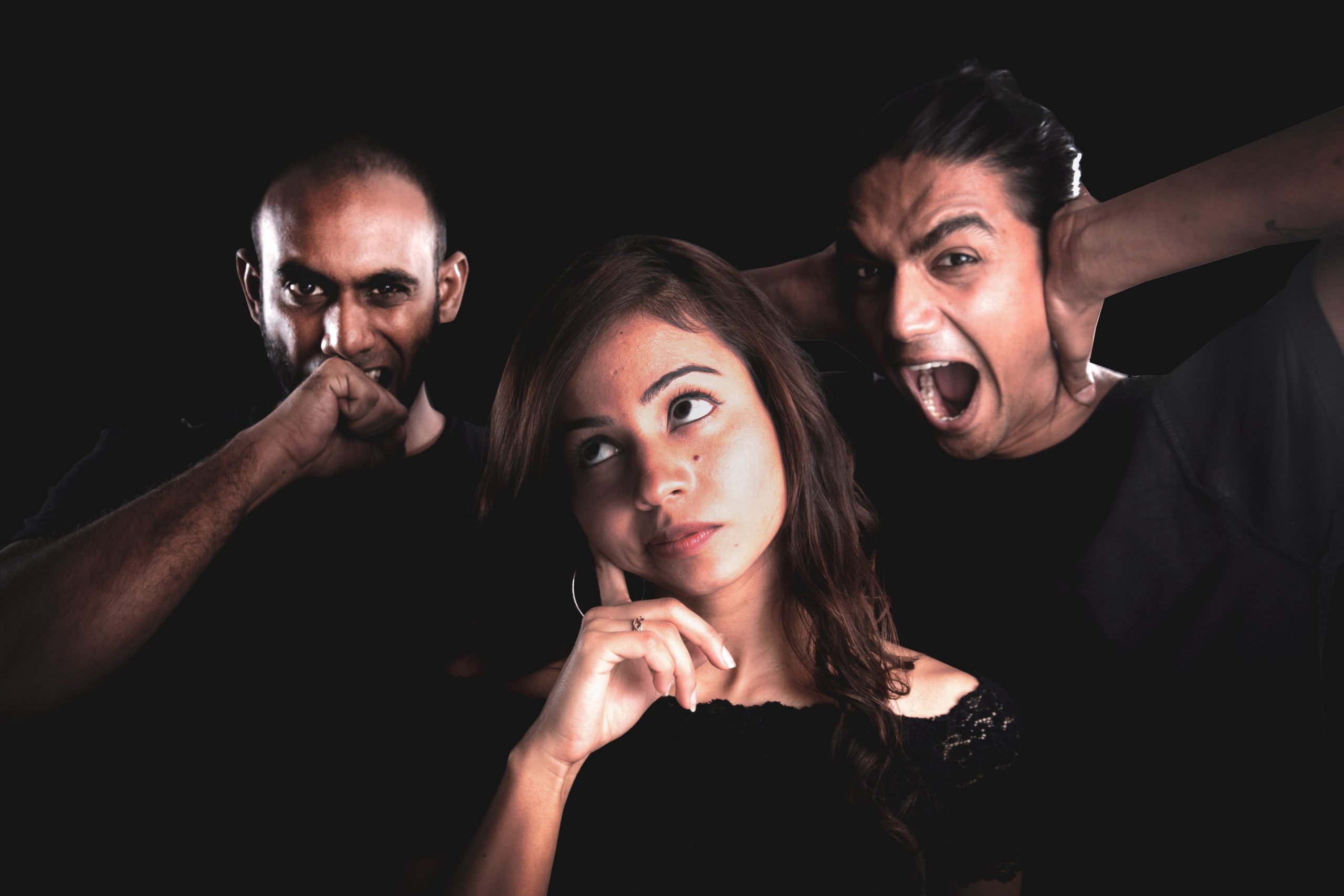
(Left to Right: Manny, Nirupama, Skip aka Totoroto)
The trio behind “BLANK”: A Live electronic music act from India that evolved from three friends trying to push the boundaries of conventional DJing to become one of the country’s top electronica band. Blank was picked as India’s best live act by MTV in 2010 and was invited by Bestival, the UK to Perform).
As an Indian living in Europe, I come across many cultural cliché’s and stereotypes about India’s electronic music scene which resulted in being asked, if we do listen to house/techno music to if there are underground clubs and parties in India. My personal experience is a stereotypical trap into this idea of India that is very homogeneous that is filled with sitars, Yogi’s, and psychedelic trance with Lord Shiva. Nikhil and Manny, you guys have traveled and introduced some of the interesting and forward-thinking international electronic acts, you have traveled and bought many DJs/promoters to India, what are some of the cliches you faced and Nikhil you enlighten us with your experiences and thoughts?
Nikhil: In my experience, one of the things that take many international DJs/producers by surprise is that fans in India are very aware of their music and are familiar with their sound. In essence, our, musical knowledge and the openness for new sounds take many by surprise when they play here. if you are one of the artists who haven’t traveled a lot outside Europe and you haven’t really read up about India and its diversity. You have a “stereotypical” wrong image in your mind which consists of elephants and snake charmers and all the other possible cliches. This, I generally find it amusing. But in contrast, when they land here I think that’s one of the things that does occasionally catch artists by surprise on how the Indian crowd is connected to electronic music via the Internet. But then again, the deejaying community, in general, is more progressive and multi minded so I don’t want to put every international DJ in this box. So in most cases, artists coming to play India do their research and are aware that do know India’s is a well-developed country with terrific cultural infrastructure such with very diverse forms of music from different parts of India, good access to the internet, fashion, clothes, music, and cuisine. So I generally do not come across many cliches as a musical director much. But of course, there is a great curiosity among artists. People are aware that we have one of the world’s largest growing electronic music community that pushes and showcases all genres, on top of the Bollywood music scene, which is our largest scene in terms of share. I would like to point that Bollywood music is one of the blankets that cover all movie industry from the north to south (which has Kollywood, Tollywood, etc). Bollywood music used to account for 92% of music sales some time ago while this has dropped to 85% and now the latest stats show that it only accounts for 80% so independent music labels and genres have come to take the rest of the 20% and I see this growing as Indians will always embrace new sounds since we are from one of the musically diverse countries in the world, in terms of heritage and the new Indians are extremely socially active and well connected to the musical world and their fav artists.
But I do understand the confusion of depicting India just as Bollywood music and Psy-trace as they are our biggest imports but India has a thriving hip-hop scene, electronic, and evolving drum & bass, and a breakbeat scene as well. People are open here since we have experimented with music and rhythm patterns for decades in this country
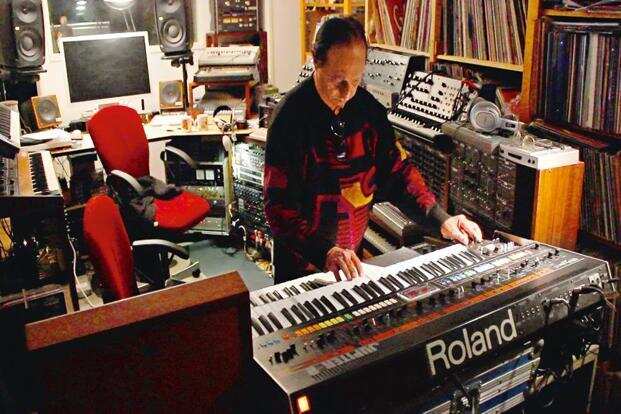
(RIP: Charanjit Singh, A Bollywood musician from Mumbai who played in numerous Bollywood soundtracks in the ’80s, eventually became the father of Acid house due to his later discovered 1983 album, Synthesizing: Ten Ragas to a Disco Beat, which surprised cratediggers in the west due to his innovative approach of combing Ragas (A melodic framework in Indian classical music with the legendary Roland TB-303 squelching acid sounds).
Manny, How do you feel the culture, history, and way of life in India influences today’s nightlife and the scene?
It certainly does to a large degree, though Indian nightlife culture is relatively younger than most European countries It has grown tremendously in the last decade. The changes to the Indian economy over the last few years, along with India having the largest youth population in the world means all of this certainly has an influence on the rapidly growing Indian nightlife business and culture. Like the country, Indian nightlife has a very distinct flavour of so many different kinds of music palettes coming together and morphing and creating its own unique identity. While Bollywood is still and will probably always be the predominant choice of music here, there is also a booming counter-culture that is distinctly Indian and inspired by the Indian way of life which emotionally connects and speaks to the community and influences the scene in a very profound way.
(Magnetic Fields Festival of contemporary music and arts that takes place in Rajasthan in Alsisar Mahal, a 17th-century palace is observed as a three-day cultural exchange event and is leading the electronic music scene festival space that invited artists such as Black Madonna, HAAI, Deena Abdelwahed, Hunne and Palm Trax to name a few).
Nikhil, you are the founder of Submerge and the musical director of the first electronic music festival in India, can you tell us a bit about your path? What defining moments are you most proud of and what gives you the motivation to keep pushing and evolving?
Nikhil: Well, most of it was started by my then-girlfriend and wife now Dj Pearl. She used to work for an airline so that allowed her to be in Amsterdam several times where she used to buy her favorite records and bring back to Delhi and play it to her friends. This is the period of her life when we met and I fell in love with her. We traveled to Europe to share what we love doing the most, dancing, we did one week each in Amsterdam, Berlin, Barcelona, and London. This was a pure dancing holiday for us and it was my wife who wanted to bring her favorite DJs and sounds from Europe back to India.
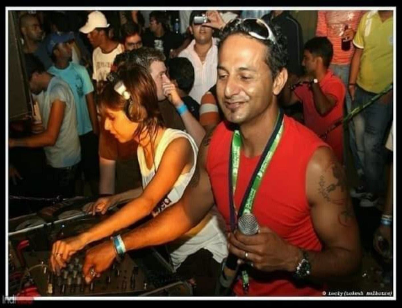
(Nikhil and Pearl at the early days of submerge parties in Goa)
This led to the invitation of the first couple of DJs that we bought to India, this was pure because of our whole Europe trip, as the only thing that we always missed on the dance floor were our friends, so she took it as her personal mission to share the music she experienced in all its glory to our friends who couldn’t travel to these places. This is how our initial journey started and to date, this is still the main reason why we love doing events because it brings the music and the communities together under one roof. For me, electronic music festivals and parties are still places that you go with your loved ones purely because you wanted to share that experience of listening to that song and dance around with people that you love and with strangers who love the same music. This is an exceptional power for me and always been the prime factor that kept us going for years.
Since Sinchi is based out of Amsterdam, I am happy to share this story since it has a strong Amsterdam angle. The first guest DJ, Pearl bought down to India, was the director of “Roxy”, Mckeel who still remains to be one of our closest friends. She used to go there a lot, heard him play and eventually he became one of the first international DJs to play at our party. it was the microsome of what Amsterdam is all about because we saw so much diversity in that place. Roxy still has a significant place in our memories since it’s such a special venue. It just felt very special. Pearl also heard “Xavier Pereck” at CLUB NL, who possesses the largest collection of lounge music and it was a time lounge music was making an explosive wave in India. She met him and said, listen, I love your music and would like you to come and play in India, while had a holiday booked that year coincidentally so we booked him some gigs in India in different cities and he eventually played at our party as well and that’s how it started.
Oh, pearl also had been to Bloemendaal and the beach parties over there and she wanted to do something like that back in Goa so we applied all of our experiences there to what we wanted to do in India. Amsterdam has an influence on what we wanted to do here. I do not want to reduce Amsterdam to its nightlife but the Dutch culture and the vibe there had and will have a huge impact on us. The people we met in Amsterdam were hugely influential as well. One of my crazy moments was at one of the old Dutch acid house parties which my friend took and it was just five thousand people, who were dressed up in costumes and the whole night was just a raw acid house and I have never seen something like that. Dutch people are very special to us in our outside world experience as we have never seen a community like that and In that respect, there will be a huge influence on what we did and will do.
Could you tell us a bit more about when the switch happened where a party focusing on sharing your music with your friends to a Festival like Supersonic and when did you feel comfortable to make that jump?
Nikhil: It sort of happened organically and I would never associate it with a moment as such. After we came back from Europe, we started to play music at a friend’s shack in Goa, Zanzibar. We loved playing there since it had that kind of vibe where you can play all the records you love. It was a completely free party. There is always something special about playing music out facing the ocean. Initially, there was nobody but we kept doing that we started to gather a crowd. In the following year, Mc Keel? (check with Nikhil) and he played at Zanzibar which resulted in getting about 100 people there and we kind of kept the phase going until Smirnoff said, We are doing something, and would you like to part of it. They asked us to host the Pre-party at the beach, which was pretty much what Mambos and Café Del a Mar used to do in San Antonia at Ibiza. It was also the regulation in Goa that you have to shut music by 10 pm so it perfectly fitted our beach rave scenario. We said yes and they supported us financially and that was the first time, things went official as a pure afternoon affair with some big speakers on the beach and the rest was a party. Later we slowly made the transition towards nighttime parties at clubs, while still doing the beach time sessions at Zanzibar which grew as time passed so that allowed the ability to rooster DJs both locally and internationally with a proper time slot. Then something happened, the folks from “Precept”, an event company got in touch with us asking, if we would like to do a festival so it was natural for us to take the idea, the lesson that we learned from Zanzibar, Smirnoff sunset sessions to place it in a slightly larger format. It just felt right and we did it. It evolved into a festival.
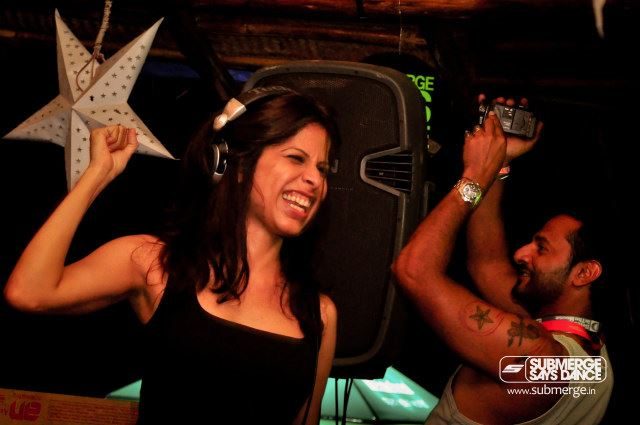
(Pearl and Nikhil performing @ Zanzibar in 2018 reunion party)
Against this backdrop, we also did parties in Delhi, the party necessarily didn’t have a name but we started to call it to submerge. To my knowledge, it was the first time an electronic music party was given a name. The reason we called it to submerge since it was happening in a club called “Rock Bottom” so I suggested let’s go a little lower than. We even made our first flyer which had gigantic ice tipped upside down with its top sunk below. Later we did the parties across India with the same name and started taking the music with us.
Now with supersonic, we have a team of people who take care of different genres at different stages and since the vision, I had for supersonic was never for it to remain as an electronic music-only festival. Near the launch, I did an interview, I said, the intention was it to be the Glastonbury of the east but without that mud and rain and that vision still holds true for me. Eventually, the festival I want to work with is not to ideally just one genre of music, and in fact, it shouldn’t stop at music. It should have other dots as well and also include a visually enhanced, digital experience with great food, and all of these dots should be connected to make it as a whole for me. I always envisioned it as a complete sensory experience.
With respect to music, we are constantly pushing the envelope as we were booking Hip-hop/Grime acts like Foreign Beggars and fresh rock acts before they became big in India. We bought down Matador when he started so I think we have done enough bets and crazy things in our festival placing the trust in music, regardless of, if they are new or established.
(A walkthrough of SuperSonic 2020 by Nikhil Chinappa which took place in February)
Manny, you have been a regular fixture on the Indian club circuit and transitioned from being one of the most important DJ exports from Chennai over the years to a curator of several projects while still being at the forefront of your sound. From the collective Sound Faction back in 2003 to spearheading Cyfer (arguably the country’s first underground electronic music podcast and a series of nights in the south of India) to Blank (India’s favorite live electronica act) and with your recent projects like 11:11 and Contrast. With over 16yrs of DJing under your belt and having sustained your brand for such a long time whilst-constantly evolving. Can you tell us a bit more about your journey and the barriers you faced then and the barriers you continue to face now when introducing new sounds and ideas in a country where trends catch on so quickly and gentrification happens in a few months, rather than years?
Manny: With way more access to music over the last decade, today’s generation of Indian clubbers are definitely more aware and tuned in than they were 15 years ago. It’s a much larger community today who know what they want and are digging deeper every day. Before, the struggle was in getting people and venues to accept non-mainstream music in clubs which were primarily dominated by Bollywood and the top 40 scenes. It’s definitely easier for me today to be able to showcase music in more innovative ways with the projects that I’m involved in. One of the biggest challenges I had to face is how much the lines have blurred between DJ and producer. I was lucky to have gotten in purely as a DJ but that seems to be getting increasingly difficult. Today as a good producer you can be plucked from obscurity and put amongst the top guys if you understand how to work your way around the internet and get your work noticed. Though a bit late, I managed to get into the production game and it’s been fun and I learn every day. Another thing that I’ve had to learn is to stick to my musical guns while at the same time staying current by being honest to myself about what is the kind of music I believe from my experience of 16 years can work dance floors for me. With music trends changing so quickly this is easier said than done
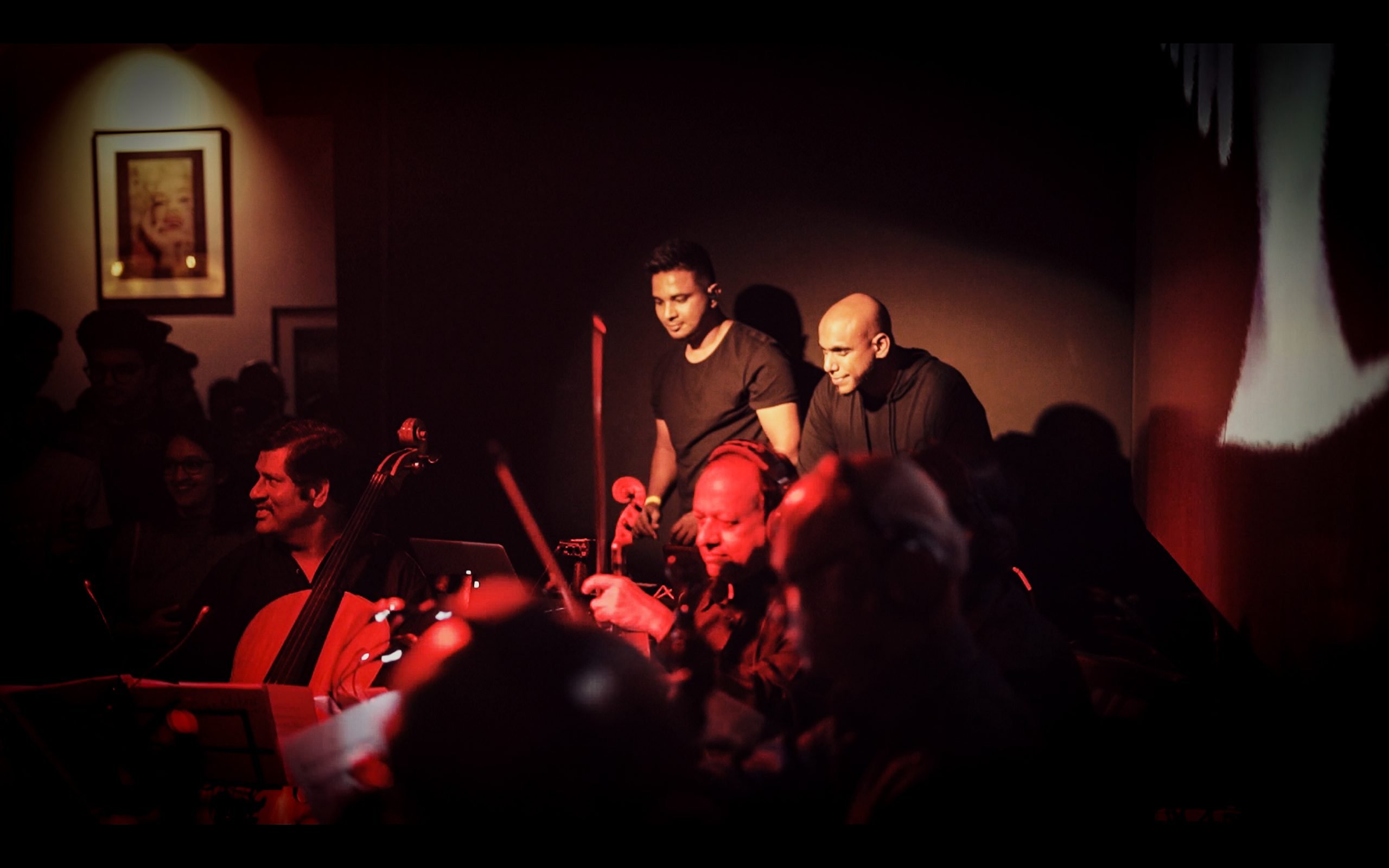
(Manny along with his production partner Ajmal showcasing the reimagination of their 2018 album 11:11 released under Submerge Music with India’s most acclaimed Madras Chamber Orchestra)
Manny, Another one of the purposes of this new Sinchi feature, is to shine a light on the music and the creative output/artists coming from the country. So we’re keen to hear about the depth of talent in the country ….you’ve both kindly curated 4 artists for this feature and would love to hear why you selected these individuals? Also if there are others you would like to give a shout out to and why?
Manny: The three sets include 8-Bit Culprit from Kolkata, Totoroto from Delhi, and myself – I wanted to show a wide variety of styles and sounds for this showcase while keeping the flavour distinctly Indian underground.
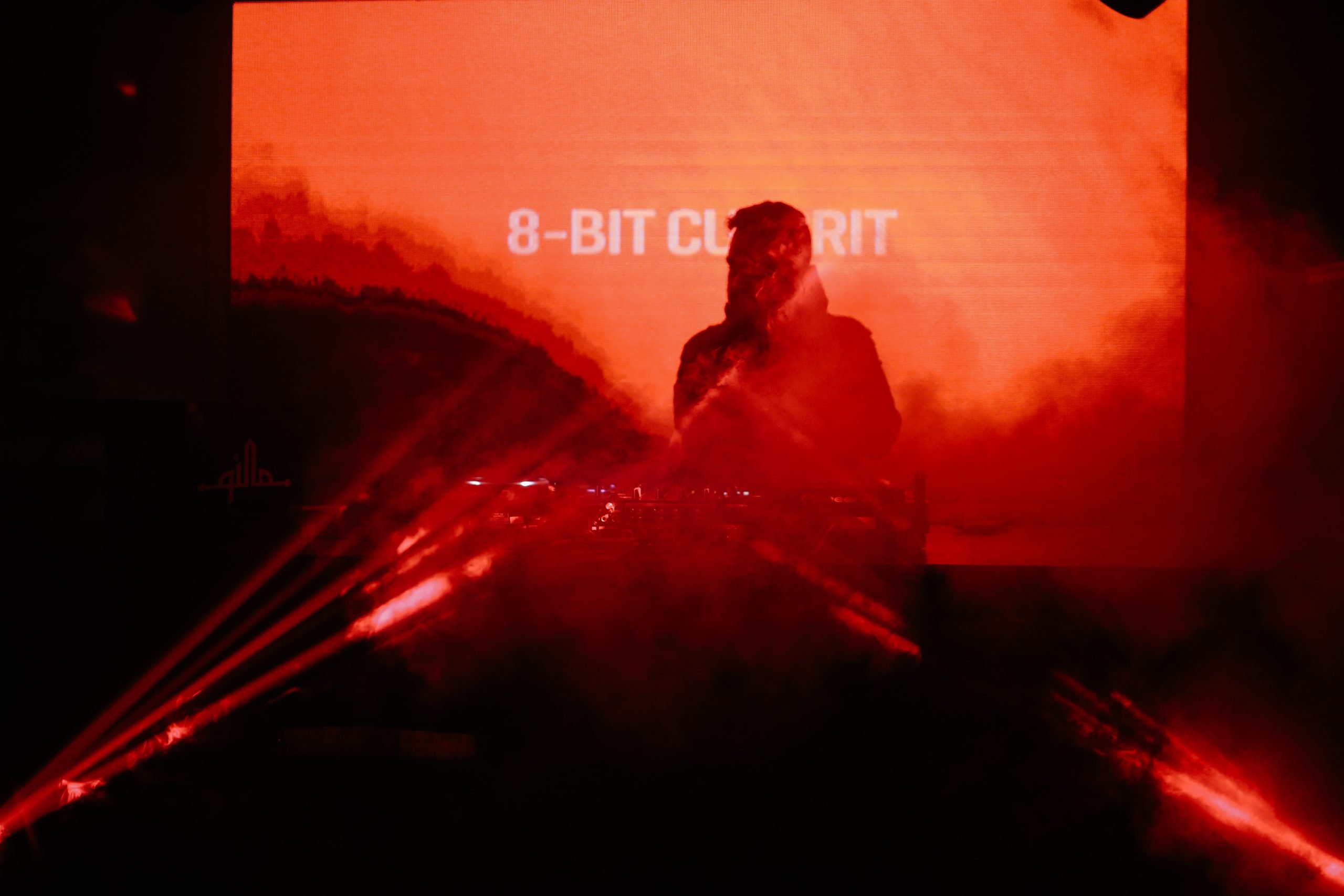
8 Bit Culprit @ Summerhouse – New Delhi playing for the Indian breaks record label – Qilla records labyrinth party
8 Bit Culprit is easily one of my fav producers in India at the moment and one to keep an eye out for in the future. He is a regular fixture on top Indian labels like Quilla and Soupherb and I felt his signature moody breaks set would be an ideal fit for this series. He put together an incredible 60mins set which includes 7 unreleased tracks of his and even his edit of a Bollywood classic by A. R Rahman.
TOTOROTO is the alter ego of DJ SKIP. Skips is easily India’s most influential turntablist and one of the most versatile DJs in the country. He is an IDA world No.3, Redbull 3style world finalist, Multiple time DMC India winner besides having numerous other championships under his belt, and the first turntablist in the country to be on an Emmy award-nominated reality show. I invited Skip to stitch 60 mins of different styles of music as only he can sampling Indian instruments, music, and films into his eclectic set.
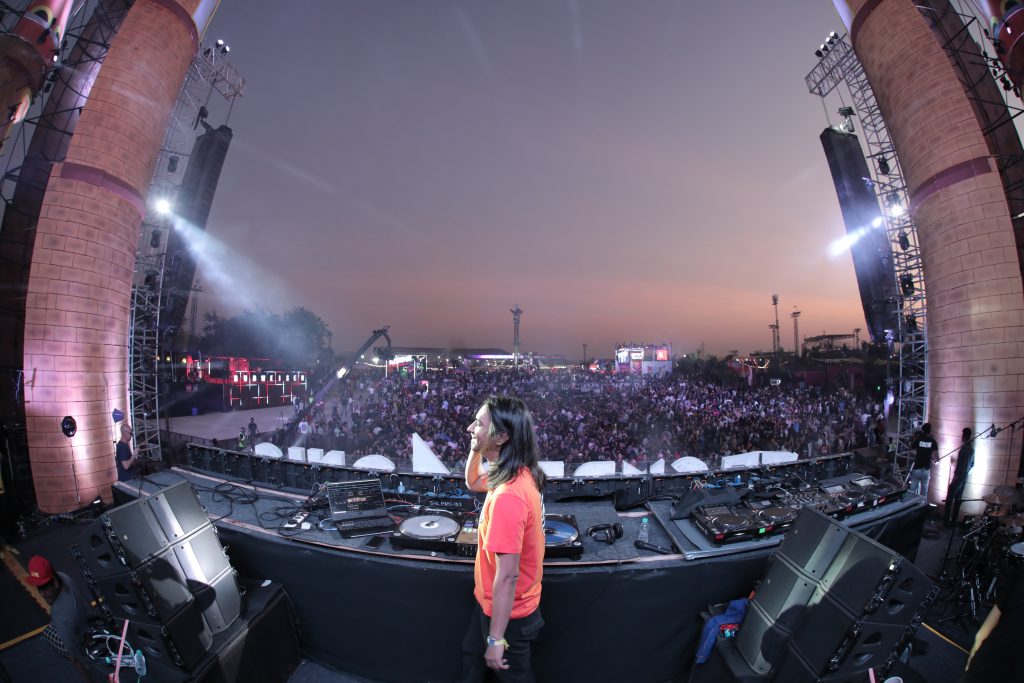
(Totoroto aka DJ Skip @ Supersonic, Pune, India)
Finally, I have put together a 60 mins Indian artist exclusive. This showcase would have been incomplete if I hadn’t featured the extraordinary work coming out of the county right now by some of the finest producers from different genres. I have tried to fit in as much as I can in 60 mins. I wish I could have squeezed in more, but I think this would give one a pretty fair idea of the kind of talent and sounds in India at the moment
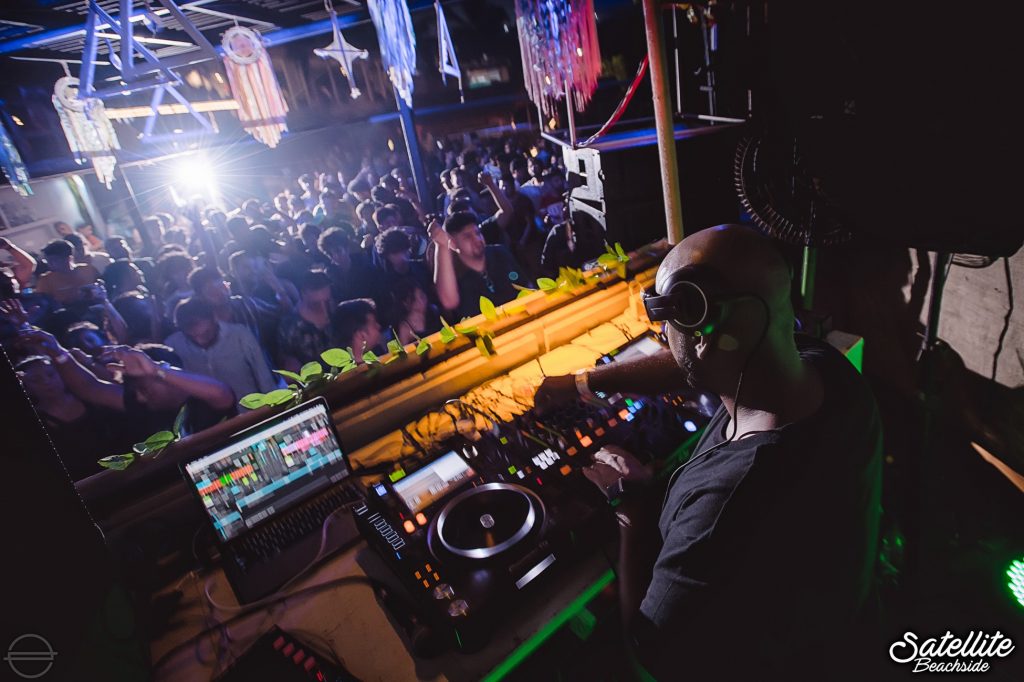
(Manny @ Satellite Beach Goa, a Submerge party held every year in December)
We would be interested to know a bit more about diversity in the Indian scene and how open, inclusive, and progressive it is? With regard to gender, sexuality, race, etc. Personally, electronic music parties paved the way for me to meet people from the LGBTQ community and my first introduction to break the idea that sexuality is not binary. Over the years, where are the areas progress has been done and where do you both believe there is still work to be done?
Nikhil: I think we can proudly say the electronic music dance community is by large and arguably one of the inclusive music community on this planet and that’s no different for India, in any aspect, with our scene, I haven’t seen any real issues in terms of inclusivity with respect to the LGTBQ in India over the past decade itself. Having said this, I am not seeing there aren’t problems beyond our community. They have gone through dark phases and have gone through ostracization. I am sure there would have isolated incidents where people faced discrimination But in general, based on experience, India is also a country with so much diversity, and we generally the policy of living and let live. But to be fair, the LGBTQ community in India hasn’t been very open as well India, so people were, as long as I am not aware of it, you do your thing and I will do my thing which is a great way of life. But, I absolutely believe that people need to be more open-minded. “Above & Beyond” are our long term friends and when they came to India, actually it was a drive on the way to Chennai Airport, “Tony Mc Guinness,” said something that stuck with me until this day, “the whole world needs to come to India and spend a week just to learn how to get along with each other. It’s something that made me think, considering how densely populated we are, most of the time of our history we got along with each other peacefully. Tony went on to say that, if you put that many European closes to each other they’d kill each other. Religion and our spirituality play a big role in this since we have this idea, we are on the planet for a short while so let’s get along while we are here.
But on this backdrop, India has only struck down a British era law that criminalized homosexuality, which, basically deemed homosexuality as an unnatural act but it has only been struck down or removed but the government still does not legally recognize same-sex marriages. so there is still a lot of progress to be done on that front.
With respect to gender equality, we have a lot of progress to be done and we need to work harder on that one because there is still a strong sense of patriarchy in India that women belong in the kitchen and not at work or other privileges or rights that we enjoy.
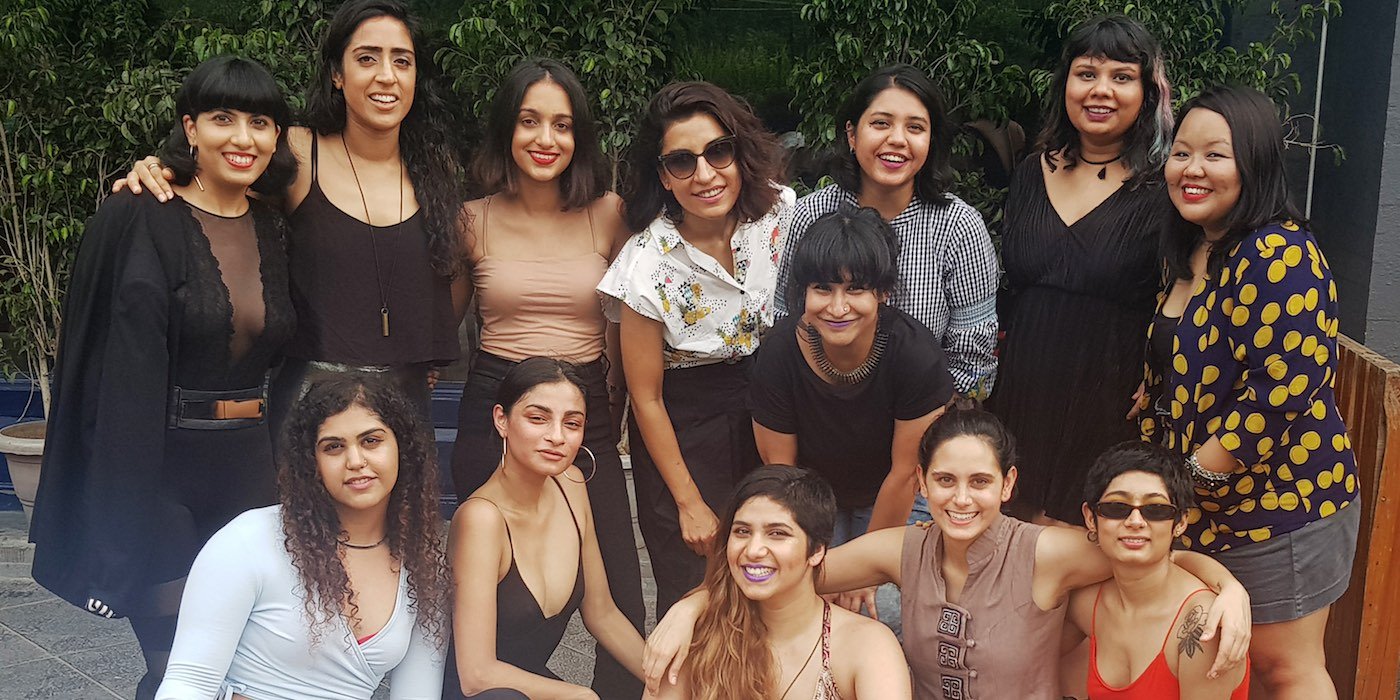
(Coven Code is a creative collective that aspires to build a creative culture around sound by focusing on encouraging artistic expression for a woman. Their sounds span from house, techno, and hip-hop to psytrance, reggae, and electro-swing)
We’re also keen to get your views on cultural appropriation as it’s a hot topic around the world at the moment. Indian classical music and Bollywood music edits have become increasingly popular in recent years and I presume that it is not very “cool” to play a Bollywood track in an electronic music party in India as you will be discredited but that’s not the case here, We wondered how you feel about that being exported without the original context and perhaps even incorporated by artists from other cultures into their music?
Nikhil: Sampling is one of the foundations of dance music so there will always be people sampling music from different parts of the world. If you sample from a Russian or Indian classic, it doesn’t really matter to me but it’s important to me that people of the original content and story behind it should be credited. I would love for more Indian music to be sampled and recreated and reinterpreted for an entirely new generation.
Finally, in a few words can you say why the electronic music aficionado should visit India and which cities are leading this march and what can they expect to experience in these cities and at the events you host, In terms of vibe, energy, and genres?
Nikhil: People who come here should know, no two cities are one, it’s very diverse and each city has its own vibe, own local culture, and scene. In India, clubs operate nights with a specific genre so you could go to a club on a Thursday night and you would be listening to Bollywood but the same night on Friday would be hosting an underground night so people should know which night they should be picking at a particular spot. You can have a really great any of the great cities such as Mumbai, Chennai, Delhi, Pune, and Calcutta but each will bring its own character to the dance floor. It all depends on the night and mainly the promoter and the artist that night then you might have a great night in the most unusual setting in your life. it’s still a young scene, but definitely, the community is growing and expanding rapidly and people are doing great parties at different and unusual places.
One of the common things, that I hear from many DJs who play here that the vibe and energy in India are like none other. I think that Indians are very hospitable so they generally have a better time than they expected when they come here to play or party.
Most of the western world might not be aware of the uprising of a new generation of promoters, artists, and venue owners making a great effort with good intention to put amazing music out there and aiming to build an innovative and nonexistent structure around what they are doing within the industry that will act as a platform for further growth of the Indian electronic music scene.
